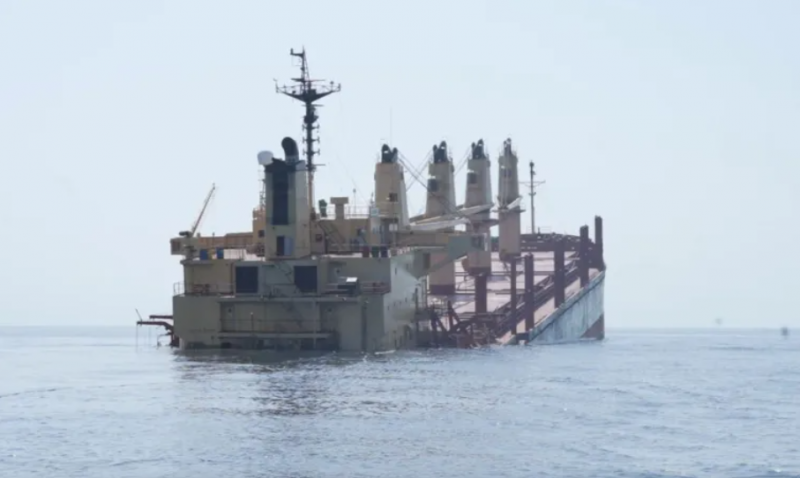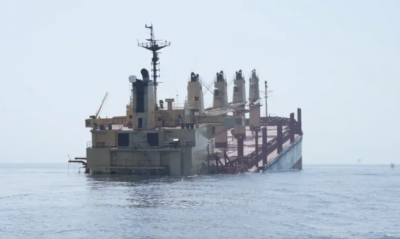The Minister of Water and Environment in the internationally recognized Yemeni government, Tawfiq Al-Sharjabi, confirmed that the cargo ship Rubimar, owned by a British company, sank fully with its cargo early this Sunday, 16 miles from the Yemeni port of Al-Mokha. This occurred two weeks after repeated appeals from the government to save the country from this environmental disaster.
Al-Sharjabi told Reuters that the ship began to sink earlier, then tilted on its stern and descended vertically to the bottom at a depth of 150 meters in the sea. While the ship was carrying a load of ammonium phosphate, which is not highly toxic, its danger lies in the fact that it is an inorganic fertilizer that can dissolve in water, making it difficult to remove in the future if it mixes with seawater, which would have severe impacts on marine life and the marine environment in the Red Sea area in general.
He emphasized that the damage would be significant to fish, coral reefs, and mangrove forests in the area, affecting biodiversity and leading to oxygen depletion and impacts on aquatic life. The ecosystem of the southern Red Sea is characterized by coral reefs, coastal mangroves, and diverse marine life.
He noted that these threats include the fish stock on which the majority of fishermen in the community rely, resulting in increased poverty and unemployment. Yemen is experiencing the worst humanitarian crisis in the world, in addition to the numerous economic damages caused by rising transportation and insurance costs, as ships avoid navigating the Red Sea due to attacks like this.
Al-Sharjabi, who heads the government crisis cell dealing with the sunken ship disaster, stated that managing a disaster of this magnitude is beyond the capabilities of the Yemeni government to handle alone, as Yemen has been at war for nine years and lacks the resources to do so independently. He stated that the regional and international community should take responsibility for what is happening in the Red Sea concerning conflicts and disasters, as protecting international shipping routes serves not just Yemen but the entire region and global trade.
He explained that international experts would arrive in Aden tomorrow and the day after to provide their expertise and assist the government in addressing this unprecedented crisis in Yemen from a technical and professional level.
In response to a question regarding the possibility of suing the ship's owning company, the Yemeni Minister of Water and Environment mentioned that the relevant government agencies are in the process of contracting an international lawyer to take the necessary actions according to the legally defined responsibilities of the owners, the insurance company, and various related parties, especially concerning the consequences of any pollution that may occur to the Yemeni marine environment due to what happened.
The fishing sector in Yemen provides job opportunities in fishing and related activities for about 500,000 people who support nearly 1.7 million individuals. The ongoing conflict in Yemen has affected around 70 percent of small fishermen, who are the backbone of the fishing sector, according to United Nations data.




